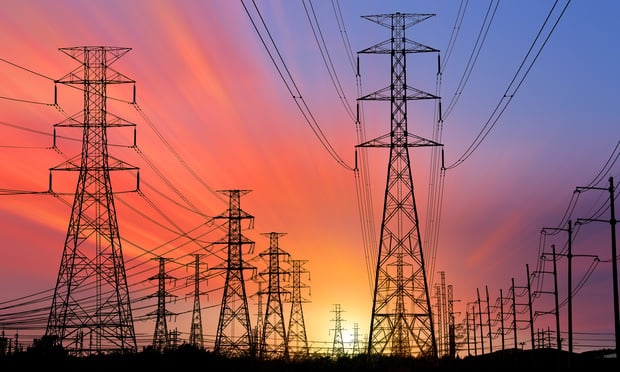Court Upholds Ruling That PECO Distribution Expansion Is Not Anti-Competitive
The court's June 2 ruling is a rejection of energy provider NRG's argument that PECO's stated price-to-compare was too low and did not reflect the actual costs to customers, putting other service providers at a competitive disadvantage.
June 04, 2020 at 02:58 PM
3 minute read
 Photo: Shutterstock
Photo: Shutterstock
An en banc Commonwealth Court has upheld a ruling that a base rate increase in distribution of PECO's energy services is not anti-competitive.
The court's June 2 ruling is a rejection of energy provider NRG's argument that PECO's stated price-to-compare was too low and did not reflect the actual costs to customers, putting other service providers at a competitive disadvantage. PECO, the state's default service provider, or DSP, is responsible for obtaining sufficient electricity for those Pennsylvanians who don't shop for an electric generation supplier (EGS).
According to Judge Renee Cohn Jubelirer's opinion, NRG proposed a modification of PECO's plan, with a different methodology to allocate a percentage of indirect costs between PECO's distribution and default services, treating them as two separate sections of PECO's operations. However, the state Public Utility Commission did not agree with NRG's methodology.
On appeal, NRG argued that the commission erred in accepting PECO's cost allocations and rejecting NRG's alternative methodology because, according to Jubelirer, the commission did not apply the proper burdens of proof, NRG argued, and the commission's approval is inconsistent with the Electricity Generation Customer Choice and Competition Act and prior decisions from the Commonwealth Court and the commission. NRG also argued that the commission's determinations are not supported by substantial evidence.
However, the court disagreed and pointed to expert testimony accepted by the board.
"We conclude a reasonable mind would accept PECO's … credited evidence as sufficient to support the conclusion that PECO's rate and cost allocations were just and reasonable. In contrast, because the commission rejected NRG's evidence as not credible or compelling, the commission's finding that NRG did not meet its burden of proof on its proposed cost allocation is likewise supported. Therefore, there is substantial evidence to support the commission's opinion and order," Jubelirer said.
"The Competition Act was intended to help consumers by creating a more competitive electric market through the unbundling of the three functions of the market," she continued. "However, the Competition Act also created a safety net, a DSP, to provide electricity for distribution customers should they choose not to shop for generation services or should an EGS fail to provide service. While we acknowledge NRG's desire to promote what it believes would be a fairer market that would enhance competition, the commission was not persuaded by NRG's evidence and arguments. Therefore, we affirm the commission's opinion and order."
Kenneth Kulak of Morgan, Lewis & Bockius represents PECO and did not respond to a request for comment.
A spokesman for NRG said in an email, "We are disappointed with today's decision. True energy competition can only be achieved if the rates and prices consumers see are accurate and fair. An independent study, performed by a respected forensic accounting firm, showed that was not the case because all customers in the PECO territory are overpaying for delivery services. We will continue to work with the PUC and other stakeholders to ensure that distribution costs are fairly allocated."
This content has been archived. It is available through our partners, LexisNexis® and Bloomberg Law.
To view this content, please continue to their sites.
Not a Lexis Subscriber?
Subscribe Now
Not a Bloomberg Law Subscriber?
Subscribe Now
NOT FOR REPRINT
© 2025 ALM Global, LLC, All Rights Reserved. Request academic re-use from www.copyright.com. All other uses, submit a request to [email protected]. For more information visit Asset & Logo Licensing.
You Might Like
View All


Feasting, Pledging, and Wagering, Philly Attorneys Prepare for Super Bowl
3 minute read
TikTok Opts Not to Take Section 230 Immunity Fight to U.S. Supreme Court
4 minute readLaw Firms Mentioned
Trending Stories
- 1Coral Gables Attorney Busted for Stalking Lawyer
- 2Trump's DOJ Delays Releasing Jan. 6 FBI Agents List Under Consent Order
- 3Securities Report Says That 2024 Settlements Passed a Total of $5.2B
- 4'Intrusive' Parental Supervision Orders Are Illegal, NY Appeals Court Says
- 5Federal Laws Also Preempt State's Swipe Fee Law on Out-of-State Banks, Judge Rules
Who Got The Work
J. Brugh Lower of Gibbons has entered an appearance for industrial equipment supplier Devco Corporation in a pending trademark infringement lawsuit. The suit, accusing the defendant of selling knock-off Graco products, was filed Dec. 18 in New Jersey District Court by Rivkin Radler on behalf of Graco Inc. and Graco Minnesota. The case, assigned to U.S. District Judge Zahid N. Quraishi, is 3:24-cv-11294, Graco Inc. et al v. Devco Corporation.
Who Got The Work
Rebecca Maller-Stein and Kent A. Yalowitz of Arnold & Porter Kaye Scholer have entered their appearances for Hanaco Venture Capital and its executives, Lior Prosor and David Frankel, in a pending securities lawsuit. The action, filed on Dec. 24 in New York Southern District Court by Zell, Aron & Co. on behalf of Goldeneye Advisors, accuses the defendants of negligently and fraudulently managing the plaintiff's $1 million investment. The case, assigned to U.S. District Judge Vernon S. Broderick, is 1:24-cv-09918, Goldeneye Advisors, LLC v. Hanaco Venture Capital, Ltd. et al.
Who Got The Work
Attorneys from A&O Shearman has stepped in as defense counsel for Toronto-Dominion Bank and other defendants in a pending securities class action. The suit, filed Dec. 11 in New York Southern District Court by Bleichmar Fonti & Auld, accuses the defendants of concealing the bank's 'pervasive' deficiencies in regards to its compliance with the Bank Secrecy Act and the quality of its anti-money laundering controls. The case, assigned to U.S. District Judge Arun Subramanian, is 1:24-cv-09445, Gonzalez v. The Toronto-Dominion Bank et al.
Who Got The Work
Crown Castle International, a Pennsylvania company providing shared communications infrastructure, has turned to Luke D. Wolf of Gordon Rees Scully Mansukhani to fend off a pending breach-of-contract lawsuit. The court action, filed Nov. 25 in Michigan Eastern District Court by Hooper Hathaway PC on behalf of The Town Residences LLC, accuses Crown Castle of failing to transfer approximately $30,000 in utility payments from T-Mobile in breach of a roof-top lease and assignment agreement. The case, assigned to U.S. District Judge Susan K. Declercq, is 2:24-cv-13131, The Town Residences LLC v. T-Mobile US, Inc. et al.
Who Got The Work
Wilfred P. Coronato and Daniel M. Schwartz of McCarter & English have stepped in as defense counsel to Electrolux Home Products Inc. in a pending product liability lawsuit. The court action, filed Nov. 26 in New York Eastern District Court by Poulos Lopiccolo PC and Nagel Rice LLP on behalf of David Stern, alleges that the defendant's refrigerators’ drawers and shelving repeatedly break and fall apart within months after purchase. The case, assigned to U.S. District Judge Joan M. Azrack, is 2:24-cv-08204, Stern v. Electrolux Home Products, Inc.
Featured Firms
Law Offices of Gary Martin Hays & Associates, P.C.
(470) 294-1674
Law Offices of Mark E. Salomone
(857) 444-6468
Smith & Hassler
(713) 739-1250





